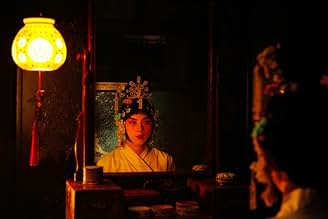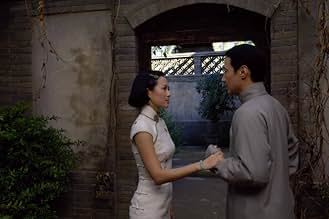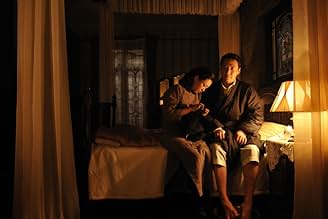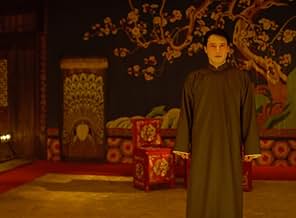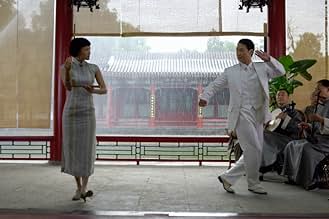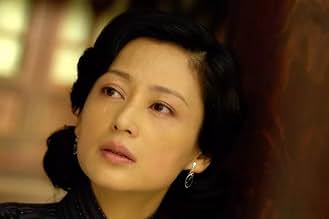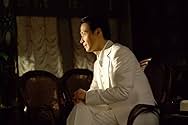Mei Lanfang
- 2008
- 2 Std. 30 Min.
IMDb-BEWERTUNG
6,7/10
1654
IHRE BEWERTUNG
Füge eine Handlung in deiner Sprache hinzuA biographical account of Mei Lanfang, China's greatest opera star.A biographical account of Mei Lanfang, China's greatest opera star.A biographical account of Mei Lanfang, China's greatest opera star.
- Auszeichnungen
- 26 Gewinne & 19 Nominierungen insgesamt
Empfohlene Bewertungen
I went in not expecting much as my Chinese isn't perfect yet and I knew it was going to be a chore trying to keep up with the words but I found it wasn't too bad to understand. In the end though I just didn't really see it as that good of a film, the script was mediocre and the acting was at times overly dramatic, even for Chinese films. I thought it was just me at first as the girl next to me was crying during the film but my friend who was also watching turned to me and said "That was terrible..." and she is Chinese so i think it really was just not very good. My Chinese is coming along and I've started to really enjoy watching Chinese movies in Chinese if only for the interest of testing my language skills but this was just not worth it. I would have preferred to go see one of the others I've already seen than to sit through this one.
Dear Director,
I can't help keeping comparing this movie with Farewell My Concubine, one of the best Chinese movies I have seen, which was also directed by you. Yes, having the same director, both tell us a story of Peking Opera singer(s), and both cover a turbulent era of certain decades during the twentieth century in China. I have to say, however, this one is disappointing, in many ways.
I have no doubt about your directing skills just by watching Farewell My Concubine. There, the roles were hysteria, and it's original, intensive, surprising, and thrilling. In Forever Enthralled, you tried to use the exactly same style, but unfortunately, it feels unnatural and overdone, as you were transfered from a brave pioneer to a boring follower of the previous yourself.
Like all types of arts, a real master piece can't be duplicated. Same as motion pictures. Farewell My Concubine is such a master piece that any mimicking trials afterwards, intentionally or not, turns out to fail, even though they are from the same director. There's nothing wrong to make another film of Peking Opera singers, but just don't use the same skill again and again.
Dear Screen Play Writers,
Did you realize the story is unbalanced? The first half of this film drags too long and the pace is way too slow, unnecessarily slow. I know you may want to emphasize Master Mei's earlier life experience that affected him so much, but the title of this film is not "The Teenager hood of Mei Lanfang".
Visiting the US actually was an important experience of Mei and also a great step to give him the opportunity to gain the international fame. However, your film made this part too weak. It's finished in such a hurry in the audiences' applause before I got a chance to focus on the singing of the leading actor. Is this a trick just because the actor couldn't perform the Opera well even though he is a pop singer? Check La Vie en Rose (2007) to see how a movie about a singer can make the singing magnificent.
Dear Ziyi Zhang,
I didn't see much improvement of your acting skills from Crouching Tiger Hidden Dragon. Not bad, but not good enough either. Yes I'm picky. But it has a long way to go before a actor/actress becomes a top one.
Dear Leon Lai,
Maybe they picked you for this role because you're a singer, but this role turned out to be too weak and too blurry. Maybe this is not your fault. They just didn't select the right person to act Master Mei. Imagine in the movie Dream Girls (2006): if Beyonce played Effie White, the situation would be insanely different.
Dear Honglei Sun,
I usually don't like those characters you played in the movie, but this one is an exception. Congratulations! You acted so well that I thought this movie should be called "The Story of Mei and His Brother Qiu". YOU ARE LITERALLY THE LEADING ACTOR. They didn't give enough chance to let Mei sing, but you got enough chance to act, and acted the best compared with others in this movie. In this movie, you were a super fan of Peking Opera and a super fan of Mei. You quit your staple teaching job and followed Mei to explore his career, felt happier about his every success than himself, worried him more than anybody else when he was in trouble, and helped him become a real master. Good job! Good for Brother Qiu, but not that good for this film, because this film is not supposed to only focus on Brother Qiu.
Dear Team,
Sorry, frankly speaking, this movie is not enthralled.
I can't help keeping comparing this movie with Farewell My Concubine, one of the best Chinese movies I have seen, which was also directed by you. Yes, having the same director, both tell us a story of Peking Opera singer(s), and both cover a turbulent era of certain decades during the twentieth century in China. I have to say, however, this one is disappointing, in many ways.
I have no doubt about your directing skills just by watching Farewell My Concubine. There, the roles were hysteria, and it's original, intensive, surprising, and thrilling. In Forever Enthralled, you tried to use the exactly same style, but unfortunately, it feels unnatural and overdone, as you were transfered from a brave pioneer to a boring follower of the previous yourself.
Like all types of arts, a real master piece can't be duplicated. Same as motion pictures. Farewell My Concubine is such a master piece that any mimicking trials afterwards, intentionally or not, turns out to fail, even though they are from the same director. There's nothing wrong to make another film of Peking Opera singers, but just don't use the same skill again and again.
Dear Screen Play Writers,
Did you realize the story is unbalanced? The first half of this film drags too long and the pace is way too slow, unnecessarily slow. I know you may want to emphasize Master Mei's earlier life experience that affected him so much, but the title of this film is not "The Teenager hood of Mei Lanfang".
Visiting the US actually was an important experience of Mei and also a great step to give him the opportunity to gain the international fame. However, your film made this part too weak. It's finished in such a hurry in the audiences' applause before I got a chance to focus on the singing of the leading actor. Is this a trick just because the actor couldn't perform the Opera well even though he is a pop singer? Check La Vie en Rose (2007) to see how a movie about a singer can make the singing magnificent.
Dear Ziyi Zhang,
I didn't see much improvement of your acting skills from Crouching Tiger Hidden Dragon. Not bad, but not good enough either. Yes I'm picky. But it has a long way to go before a actor/actress becomes a top one.
Dear Leon Lai,
Maybe they picked you for this role because you're a singer, but this role turned out to be too weak and too blurry. Maybe this is not your fault. They just didn't select the right person to act Master Mei. Imagine in the movie Dream Girls (2006): if Beyonce played Effie White, the situation would be insanely different.
Dear Honglei Sun,
I usually don't like those characters you played in the movie, but this one is an exception. Congratulations! You acted so well that I thought this movie should be called "The Story of Mei and His Brother Qiu". YOU ARE LITERALLY THE LEADING ACTOR. They didn't give enough chance to let Mei sing, but you got enough chance to act, and acted the best compared with others in this movie. In this movie, you were a super fan of Peking Opera and a super fan of Mei. You quit your staple teaching job and followed Mei to explore his career, felt happier about his every success than himself, worried him more than anybody else when he was in trouble, and helped him become a real master. Good job! Good for Brother Qiu, but not that good for this film, because this film is not supposed to only focus on Brother Qiu.
Dear Team,
Sorry, frankly speaking, this movie is not enthralled.
THere was a lot that was new to me since it reflects a different culture, So I liked it.
Though I don't have much knowledge in Pekin Opera, this traditional Chinese art is enchanting to us. The first part of this film reminded us of Farewell to My Concubine (a film directed by Chen Kaige decades ago) as it's nearly an imitation of homosexual love. I had to agree with Tracy when she said the "great" director made "Broken Back Mount" again disguised in our traditional art form, a mundane story in a luxurious robe ( a bad metaphor or simile) . The background music is genial, triggering your memory for a film decades ago.Luckily, the appearance of Zhang Ziyi at the middle of the stage, in white robe halts the tune of love between two men. THe two lovers fall into love as planned, a mediocre plot again. But destine or fate or enthusiasm for art or unfair life get them close to each other but separate them later no matter how much gallantry artists show on stage or in life. Although it's featured by super stars, the protagonist fail to distinguish in continuous conflict of paradox, every role seems to have his or her own charm to trigger sympathy from the audience. I want to say Pekin Opera is a traditional art of long and glorious history with a galaxy of artists dedicated to it. Maybe it's true sometimes it is associated with hidden oppression on human emotion and thinking and manifest its extremism in aestheticism in seeming like abnormality of human being or sometimes the Pekin opera singers outdid themselves in rendition of blend of sentiments, however, the tremendous artistic beauty survives the deviation from authentic art.
Chinese director Chen Kaige did the Chinese proud by directing Farewell My Concubine in 1993, which turns out to be the first Chinese film to receive an Academy Award nominations for Best Foreign Features (1994) and brings home The Golden Palm Awards in 1994 Cannes Film Festival.
Farewell tells us a story of 2 Peking opera actors and the bond shared between both from the 1930's till the early 90's. Today, Chen wants to bring the magic back again, and here we have his latest feature, Forever Enthralled. Also known as Mei Lanfang in Mandarin, the film serves to be a tribute to the late Peking opera master, Mei Lanfang, who was not only well known for portraying female roles in the play, but also being the first Chinese actor to performed in America.
Sad to the say, the magic seems to fail despite placing lots of effort to bring the life story of the late Peking opera master to screen.
In a duration of 147 minutes, you will see the life of Mei in three stages: teenager, young adult in his 20's, and a more matured Mei in his 40's. Featuring Leon Lai as Mei in his adulthood and Sun Honglei as Qiu Rubai, the movie should be renamed as 'Mei Lanfang and Qiu Rubai - The Two Sworn Brothers'. This can be supported with Qiu Rubai attracted and bedazzled with Mei's skills in portraying a female role, which leads him to support Mei's career in various ways.
From the young Mei Lanfang competing with his actor grandfather, short romance with fellow actress Meng Xiaodong (Zhang Ziyi) after married to another fellow actress Fu Zhifang (Chen Hong), to how he refused to performed for the Japanese during World War 2, Qiu Rubai has always been with Mei Lanfang in all ways.
The main highlight of the film which keeps the audience going on for more will be the first 50 minutes of the film. A teenage Mei (Yu Shaoqun) was a famous actor, which makes him to go a path less traveled by changing the style in a Peking opera. The conflict between his grandfather and Mei shows how Mei wants to change the presentation of the opera, so as to live up to the words left by his great grandfather, where Mei is to bring Peking opera to a new level where actors gained their respects. By defying his grandfather's wishes and creates a new play, Mei has become more famous than ever, which leads him to his stardom for the next few decades.
This is the only part of the story that really lives up to the title. The moment Mei reaches adulthood, the story has fall flat, unfortunately. Even when Chen Kaige wants to highlight the important point of Mei being the first Chinese actor to perform in America, it fails to salvage the remaining parts of the story. Being the most important point of the story, it was given a mere 10 minutes to summarize Mei's fame in America. Yu Shaoqun shines as a young Mei, where not only he was given ample time to portray his inner struggle, but also appears in various plays in the film. Leon, however, doesn't get much chance to put on the thick makeup and impersonates the beauties of the past in his play.
Too much focuses were given to Mei's romance with Meng, and how Mei refused to performed for the Japanese. Zhang's appearance of Meng takes up only 30 minutes of the story, despite being highlighted as the leading actress. Apart from a bad dubbed over during her opera performances, Zhang wasn't given much chance to explore her role. Chen Hong gets a bigger share in terms of appearances, but less lines. Her appearance as a middle-aged Fu Zhifang is a replacement of younger Fu Zhifang, portrayed by Gillian Chung. Chung's appearance in the film has been removed after the nude photo scandal in 2008, which has unfortunately, damaged part of the film. One will not know how Mei befriends Fu and in the later years of their life, husband and wife.
It was Sun Honglei who makes the film watchable. Playing Qiu Rubai from an adult to an elderly, his influence towards Mei has changed Mei's life, which was described in detail.
It is not surprising that one will compare Forever Enthralled with Farewell My Concubine. In all, Mei Lanfang shines in the real life, but Farewell My Concubine will still be everyone's favorite in reel life.
Farewell tells us a story of 2 Peking opera actors and the bond shared between both from the 1930's till the early 90's. Today, Chen wants to bring the magic back again, and here we have his latest feature, Forever Enthralled. Also known as Mei Lanfang in Mandarin, the film serves to be a tribute to the late Peking opera master, Mei Lanfang, who was not only well known for portraying female roles in the play, but also being the first Chinese actor to performed in America.
Sad to the say, the magic seems to fail despite placing lots of effort to bring the life story of the late Peking opera master to screen.
In a duration of 147 minutes, you will see the life of Mei in three stages: teenager, young adult in his 20's, and a more matured Mei in his 40's. Featuring Leon Lai as Mei in his adulthood and Sun Honglei as Qiu Rubai, the movie should be renamed as 'Mei Lanfang and Qiu Rubai - The Two Sworn Brothers'. This can be supported with Qiu Rubai attracted and bedazzled with Mei's skills in portraying a female role, which leads him to support Mei's career in various ways.
From the young Mei Lanfang competing with his actor grandfather, short romance with fellow actress Meng Xiaodong (Zhang Ziyi) after married to another fellow actress Fu Zhifang (Chen Hong), to how he refused to performed for the Japanese during World War 2, Qiu Rubai has always been with Mei Lanfang in all ways.
The main highlight of the film which keeps the audience going on for more will be the first 50 minutes of the film. A teenage Mei (Yu Shaoqun) was a famous actor, which makes him to go a path less traveled by changing the style in a Peking opera. The conflict between his grandfather and Mei shows how Mei wants to change the presentation of the opera, so as to live up to the words left by his great grandfather, where Mei is to bring Peking opera to a new level where actors gained their respects. By defying his grandfather's wishes and creates a new play, Mei has become more famous than ever, which leads him to his stardom for the next few decades.
This is the only part of the story that really lives up to the title. The moment Mei reaches adulthood, the story has fall flat, unfortunately. Even when Chen Kaige wants to highlight the important point of Mei being the first Chinese actor to perform in America, it fails to salvage the remaining parts of the story. Being the most important point of the story, it was given a mere 10 minutes to summarize Mei's fame in America. Yu Shaoqun shines as a young Mei, where not only he was given ample time to portray his inner struggle, but also appears in various plays in the film. Leon, however, doesn't get much chance to put on the thick makeup and impersonates the beauties of the past in his play.
Too much focuses were given to Mei's romance with Meng, and how Mei refused to performed for the Japanese. Zhang's appearance of Meng takes up only 30 minutes of the story, despite being highlighted as the leading actress. Apart from a bad dubbed over during her opera performances, Zhang wasn't given much chance to explore her role. Chen Hong gets a bigger share in terms of appearances, but less lines. Her appearance as a middle-aged Fu Zhifang is a replacement of younger Fu Zhifang, portrayed by Gillian Chung. Chung's appearance in the film has been removed after the nude photo scandal in 2008, which has unfortunately, damaged part of the film. One will not know how Mei befriends Fu and in the later years of their life, husband and wife.
It was Sun Honglei who makes the film watchable. Playing Qiu Rubai from an adult to an elderly, his influence towards Mei has changed Mei's life, which was described in detail.
It is not surprising that one will compare Forever Enthralled with Farewell My Concubine. In all, Mei Lanfang shines in the real life, but Farewell My Concubine will still be everyone's favorite in reel life.
Wusstest du schon
- WissenswertesMei was the first artist to spread Beijing Opera to foreign countries, participating in cultural exchanges with Japan, the United States, and other regions. He toured the world, forming friendships with the western contemporaries of his day, including Charlie Chaplin. In 1930 he toured North America, visiting Hollywood, where he was welcomed by Douglas Fairbanks and Mary Pickford. In 1935, Mei toured Europe, playing to appreciative audiences in Berlin and Moscow. Seeing Mei perform especially impressed the German playwright Bertold Brecht and influenced his concept of the alienation effect. He served as one of the mentors and guardians of the actress Li Yuru as she began her career
- SoundtracksNi Dong Wo De Ai
Performed by Ziyi Zhang, Leon Lai
Top-Auswahl
Melde dich zum Bewerten an und greife auf die Watchlist für personalisierte Empfehlungen zu.
Details
- Erscheinungsdatum
- Herkunftsländer
- Offizielle Standorte
- Sprache
- Auch bekannt als
- Forever Enthralled
- Drehorte
- Produktionsfirmen
- Weitere beteiligte Unternehmen bei IMDbPro anzeigen
Box Office
- Budget
- 15.000.000 $ (geschätzt)
- Weltweiter Bruttoertrag
- 17.773.395 $
- Laufzeit
- 2 Std. 30 Min.(150 min)
- Farbe
- Sound-Mix
- Seitenverhältnis
- 2.35 : 1
Zu dieser Seite beitragen
Bearbeitung vorschlagen oder fehlenden Inhalt hinzufügen




